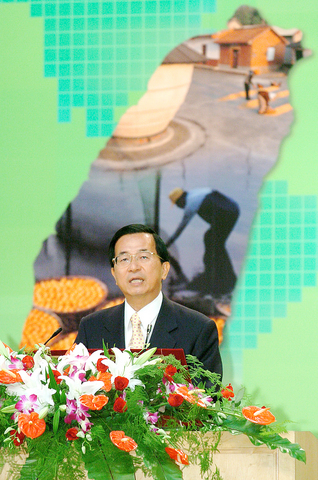As the opposition parties are responsible for blocking discussion on important bills in the Legislative Yuan, opposition leaders -- in particular outgoing Chinese Nationalist Party (KMT) Chairman Lien Chan (連戰) -- should support holding a special session, President Chen Shui-bian (陳水扁) said yesterday.
During a speech at the 12th annual conference of the Council of Taiwanese Chambers of Commerce in Asia in Taipei, Chen said that Taiwanese businesspeople had worked hard overseas for years to protect Taiwan's interests. Chen said that this spirit of adopting cooperative strategies is the only way for Taiwan to move forward.
However, Chen said it was a pity that some political figures put personal and political parties' interests higher than the interests of the people, and had not realized the importance of cooperation.

PHOTO: CHIEN JUNG-FENG, TAIPEI TIMES
Chen said that the government has been somewhat impeded not only by global factors, such as the spread of terrorism, but also by domestic factors, such as opposition parties' refusing to communicate with the government. He did not elaborate.
"I urge KMT Chairman Lien to help the Legislative Yuan convene an extraordinary session to review arms procurement and other important bills efficiently before he steps down," Chen said.
Chen said that the military imbalance in the Taiwan Strait deserves more attention, and that Lien should take the Pentagon's latest report on China's military more seriously.
"We're facing a growing threat from China. Taiwan needs to take action to ensure that it's able to defend itself," Chen said.
The arms bill was first submitted by the Executive Yuan in June last year. Since then, the bill has been blocked 26 times by opposition parties in the Procedure Committee, thereby failing to put the bill on the waiting list of proposals for review.
Last September, Chen sent an official document to the Legislative Yuan, asking for a chance to discuss the reasoning behind the bill. His request was rejected by the legislature due to a boycott by the opposition parties.
Criticizing the opposition parties' recent visits to China, Chen said that cross-strait interaction has its own pace, which is not easily altered by any single event.
Since the government lifted a ban against visiting relatives across the Taiwan Strait in 1987, both sides' have increased their interaction in diverse fields, such as economics, industry, culture and politics.
"The recent `China fever' and other controversies induced can be attributed to confusion of national consciousness," Chen said.
Chen said that Taiwan, a country having only a short history of democratization, national consciousness stressing the priority of Taiwan's interest has to be extraordinarily promoted.
Meanwhile, when addressing representatives of farmers' associations and fishermen's associations yesterday at a separate event, Chen said China's recent offer of tariff-free imports for some Taiwanese fruit was "a 100 percent political move; a full-fledged war to achieve the goal of unification" with Taiwan.
Stressing that over-dependence on China's market would be bad commercial policy, Chen added that China remains hostile to Taiwan and that markets there are full of risks. That's why the Taiwan External Trade and Development Council (TAITRA) has been designated by the government as the only agency to deal with fruit exports to China, further lowering risks, Chen said.
also see story:
Cross-party talks run aground

Taiwan yesterday denied Chinese allegations that its military was behind a cyberattack on a technology company in Guangzhou, after city authorities issued warrants for 20 suspects. The Guangzhou Municipal Public Security Bureau earlier yesterday issued warrants for 20 people it identified as members of the Information, Communications and Electronic Force Command (ICEFCOM). The bureau alleged they were behind a May 20 cyberattack targeting the backend system of a self-service facility at the company. “ICEFCOM, under Taiwan’s ruling Democratic Progressive Party, directed the illegal attack,” the warrant says. The bureau placed a bounty of 10,000 yuan (US$1,392) on each of the 20 people named in

The High Court yesterday found a New Taipei City woman guilty of charges related to helping Beijing secure surrender agreements from military service members. Lee Huei-hsin (李慧馨) was sentenced to six years and eight months in prison for breaching the National Security Act (國家安全法), making illegal compacts with government employees and bribery, the court said. The verdict is final. Lee, the manager of a temple in the city’s Lujhou District (蘆洲), was accused of arranging for eight service members to make surrender pledges to the Chinese People’s Liberation Army in exchange for money, the court said. The pledges, which required them to provide identification

Nine retired generals from Taiwan, Japan and the US have been invited to participate in a tabletop exercise hosted by the Taipei School of Economics and Political Science Foundation tomorrow and Wednesday that simulates a potential Chinese invasion of Taiwan in 2030, the foundation said yesterday. The five retired Taiwanese generals would include retired admiral Lee Hsi-min (李喜明), joined by retired US Navy admiral Michael Mullen and former chief of staff of the Japan Self-Defense Forces general Shigeru Iwasaki, it said. The simulation aims to offer strategic insights into regional security and peace in the Taiwan Strait, it added. Foundation chair Huang Huang-hsiung

’DISTORTION’: Beijing’s assertion that the US agreed with its position on Taiwan is a recurring tactic it uses to falsely reinforce its sovereignty claims, MOFA said The Ministry of Foreign Affairs (MOFA) yesterday said Chinese state media deliberately distorted Taiwan’s sovereign status, following reports that US President Donald Trump agreed to uphold the “one China” policy in a phone call with Chinese President Xi Jinping (習近平). During the more than one-hour-long call, Xi urged Trump to retreat from trade measures that roiled the global economy and cautioned him against threatening steps on Taiwan, a Chinese government summary of the call said. China’s official Xinhua news agency quoted Xi as saying that the US should handle the Taiwan issue cautiously and avoid the two countries being drawn into dangerous